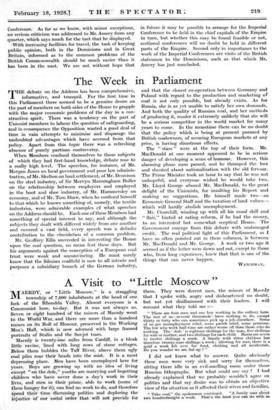The Week in Parliament
THE debate on the Address has been comprehensive, informative, and tranquil. For the first time in this Parliament there seemed to be a genuine desire on the part of members on both sides of the House to grapple with the major economic problems of the day in a con- structive spirit. There was a tendency on the part of Unionist members to labour the question of safeguarding, and in consequence the Opposition wasted a good deal of time in vain attempts to minimize and disparage the undoubted advantages which have accrued from that policy. Apart from this topic there was a refreshing absence of purely partisan controversy.
When Members confined themselves to those subjects of which they had first-hand knowledge, debate rose to a really high level. The speeches, for instance, of Mr. Morgan Jones on local government and poor law adminis- tration, of Mr. Skelton on land settlement, of Mr. Dennison on the steel industry, of Sir Mervyn Manningham Buller on the relationship between employers and employed in the boot and shoe industry, of Mr. Hammersley on economy, and of Mr. Tom Shaw, when he confined himself to that which he knows something of, namely, the textile industries, were admirable examples of what speeches on the Address should be. Each one of these Members had something of special interest to say, and although the subjects they dealt with differed widely from one another and covered a vast field, every speech was a definite contribution to the elucidation of a common problem.
Mr. Geoffrey Ellis succeeded in interesting the House upon the coal question, no mean feat these days. But his arguments against the conception of a European coal trust were weak and unconvincing. He must surely know that the Silesian coalfield is now to all intents and purposes a subsidiary branch of the German industry, and that the closest co-operation between Germany and Poland with regard to the production and marketing of coal is not only possible, but already exists. As for Russia, she is as yet unable to satisfy her own demands. And both the quality of Russian coal, and her methods of producing it, render it extremely unlikely that she will be a serious competitor in the world, market for many years to come. In the meantime there can be no doubt that the policy which is being at present pursued by British coalowners, of securing European markets at any price, is having disastrous effects.
The " stars " were at the top of their form. Mr. MacDonald at one moment appeared to be in serious danger of developing a sense of humour. However, this alarming phase soon passed, and he thumped the box and shouted about nationalization with the old fervour. The Prime Minister took an hour to say that he was not unhopeful, and everyone wished he would take two. Mr. Lloyd George abused Mr. MacDonald, to the great delight of the Unionists, for insulting his Report and making no suggestions. He himself made two—an Economic General Staff and the taxation of land values— which will hardly abolish unemployment.
Mr. Churchill,' winding up with all his usual skill and " flair," hinted at rating reform, if he had the money, to an. interested but somewhat sceptical House. The Government emerge from this debate with undamaged credit. The real political fight of this Parliament, as I have so often pointed out in these columns, is between Mr. MacDonald and Mr. George. A week or two ago it seemed as if the latter were down and out, except to those who, from long experience, knew that that is one of the things that can never happen.
WATCHMAN.






































 Previous page
Previous page